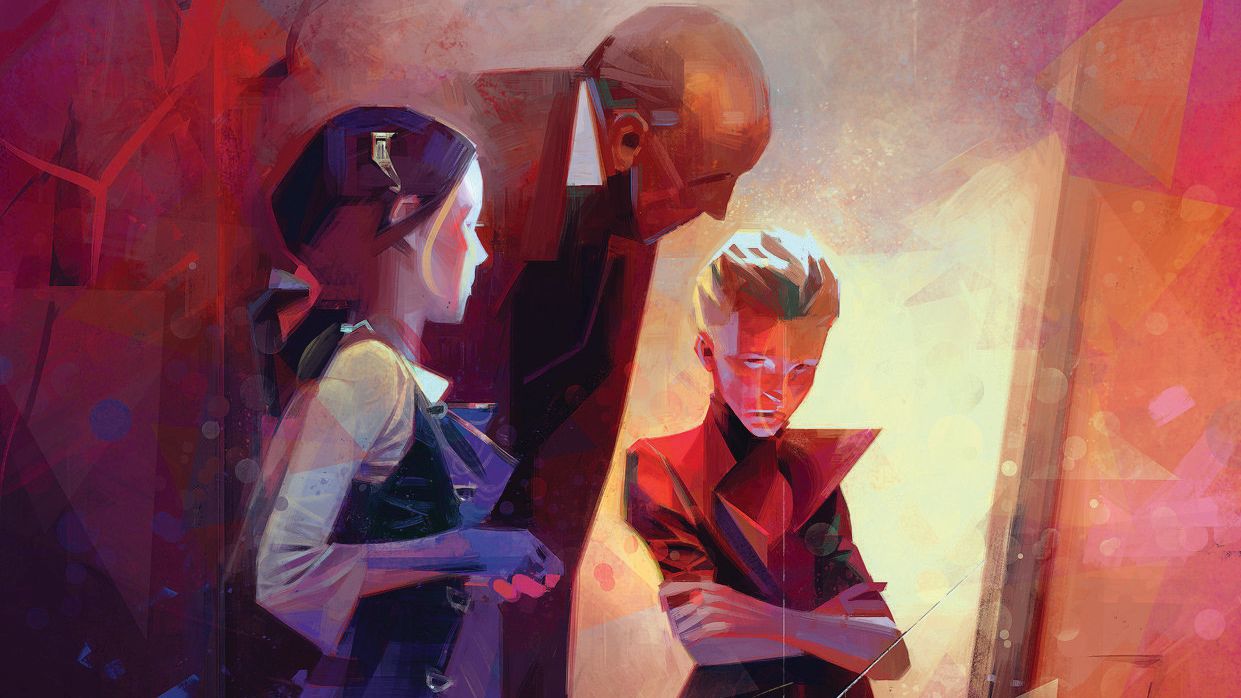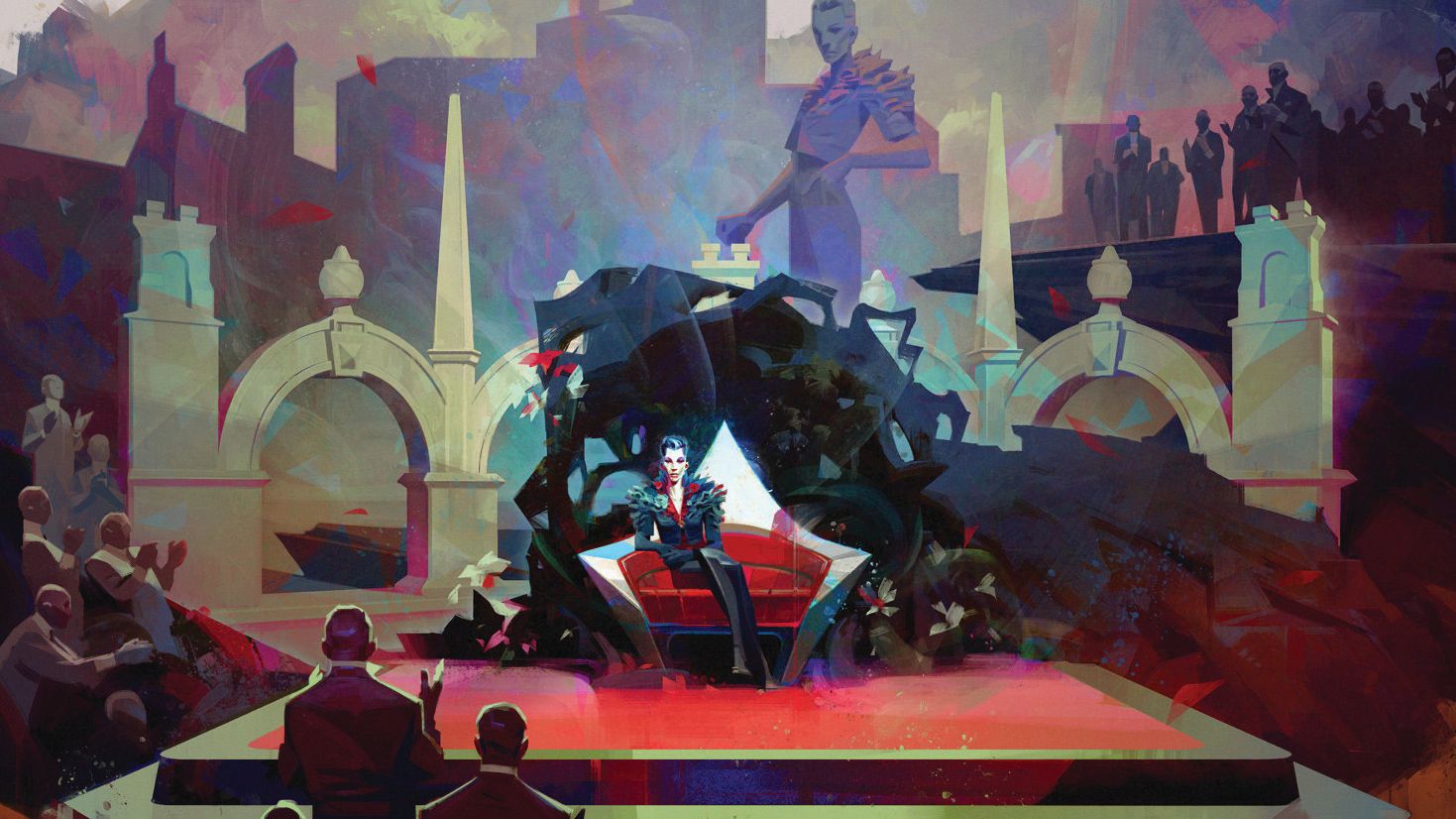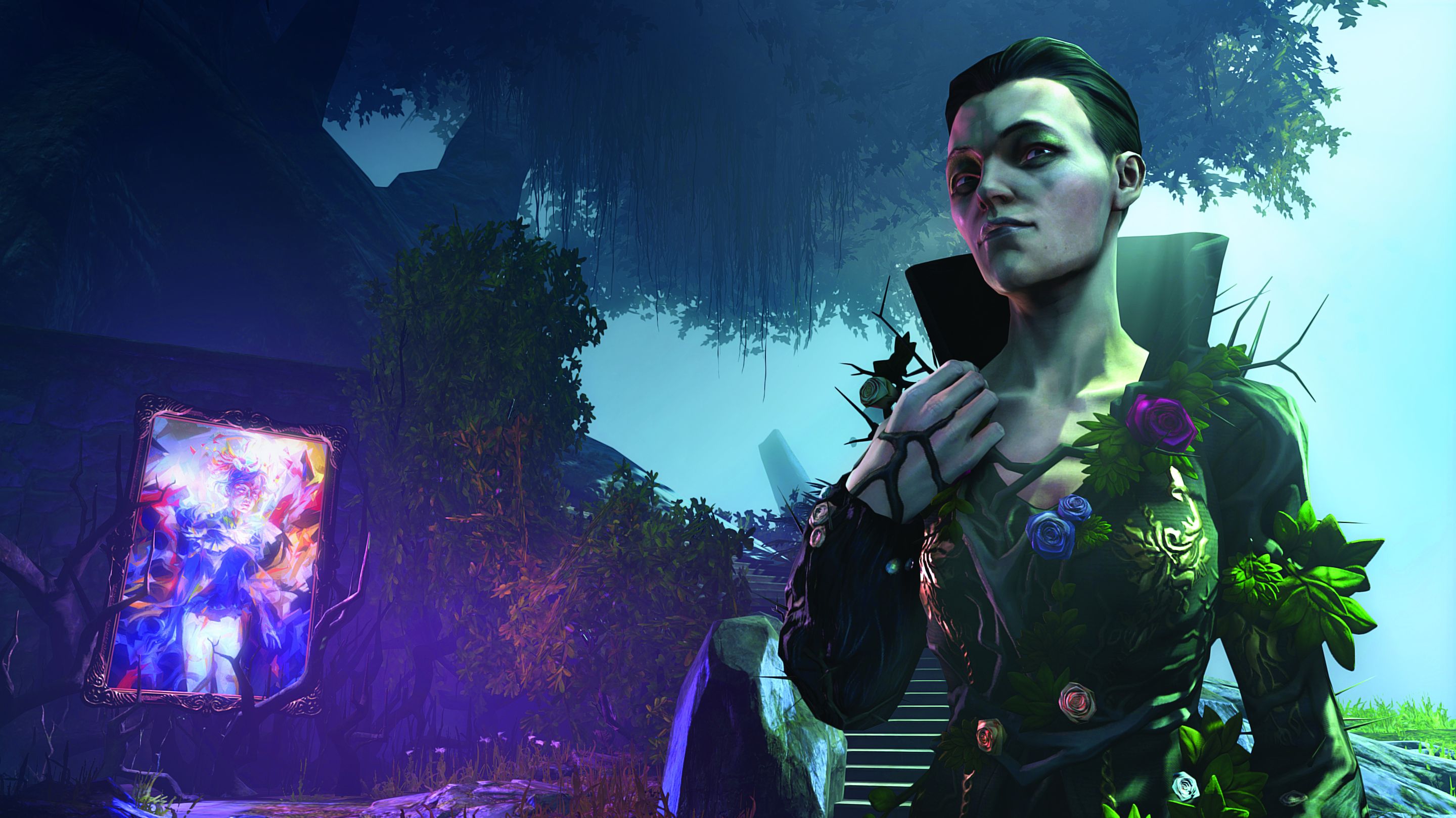How imitation and revenge drive Dishonored's heroes and villains
A web of deceit and desire.

Disclaimer: The following article is written by one of the writers of Dishonored: Death of the Outsider. Spoilers follow for Dishonored and Dishonored 2.
Delilah Copperspoon—servant, painter, playmate to a young Empress, then witch, usurper and Empress herself—is first introduced in Dishonored’s two-part DLC, The Knife of Dunwall and The Brigmore Witches. In Dishonored 2, Delilah returns to Dunwall Tower with one mission: take back what’s yours.
While Dishonored opens with Jessamine’s assassination, and Death of the Outsider ends with the removal of the Outsider from the Void, Dishonored 2 shows that the instigating act of the series’ narrative arc is one child blaming another. In Delilah’s account, a single act of childish cruelty cascades into a lifetime of misery for herself and her mother, as Jessamine’s privileged position as the daughter of an Emperor doesn’t extend to her half-sister. As a child, Delilah did not understand why she was excluded from the honour, prestige and love showered upon Jessamine. As an adult, Delilah continuously attempts to seize these things which Jessamine possessed. Her desire becomes an act of imitation.
It’s clear that, in The Brigmore Witches and in Dishonored 2, Delilah wants the throne. As a villain, she pursues power with ruthlessness and cunning. But the nature of this desire and its origins are interrogated in both games. The throne and all its power seems to be a natural thing to desire for someone as ambitious as Delilah. Indeed, her first attempt in The Brigmore Witches makes her appear to want it for the sake of it; power and prestige are assumed to be their own reward. But across the games, the throne is shown to be a symbol of social relationships as much as power. It’s familial as much as legal – meshing the machinations of the state with the entanglements of family life. This only becomes clear when confronted by Daud in the final mission; Delilah pleads with him before her magically infused painting of Emily, claiming that the young girl stole her life away.
This line, once ambiguous, becomes explicit when it’s revealed in Dishonored 2 that Delilah is believed to be the illegitimate half-sister of Jessamine Kaldwin. As daughters born out of wedlock to the ruler of the Empire, Delilah and Emily share an origin. But more than this, Delilah shows that she doesn’t simply desire Emily’s throne for the sake of it, but Emily’s entire life and history. In The Brigmore Witches, Delilah attempts to possess Emily’s body in order to take power. In Delilah’s desire for the throne, her imitation of Emily is so explicit that it leads her to try to become her. This magical possession becomes a literalised metaphor for the events that transpire in Dishonored 2.

Mirrors of desire
In this understanding, Delilah’s attempts at revenge against Jessamine are thinly veiled attempts to imitate her. And when Jessamine is assassinated and that power is handed to Emily, Delilah pursues Emily just as single-mindedly. But in doing so, she recreates the dispossession and misery which led her, long ago, to pursue the throne out of personal revenge. Motivated entirely by envy, Delilah desires the throne not because she desires to rule the land or govern the Empire. Instead, she desires the throne purely because it was denied to her, and she believes that the women who have held it since have stolen her birthright. While Delilah is focused on the injustice done to her, and the stratification of the Empire’s citizens into the haves and have-nots, she is unconcerned with rectifying any of it beyond personal vengeance. Her tragedy is as much her refusal to break the cycle of violence and desire which led to her deprivation as it is the petty, cruel and childish whims which have harmed her. Even Delilah acknowledges this when recounting the events of her life which lead to her deposing Emily. “It’s your turn now,” Delilah spitefully declares, unaware that her actions have merely created someone exactly like her, who will pursue the throne just as she has done.
She desires the throne purely because it was denied to her, and she believes that the women who have held it since have stolen her birthright.
The other antagonists of Dishonored 2 operate along these same themes, as each of the four coconspirators of Delilah’s coup can be undone by the doubles they use to exert control. Grim Alex, a Jekyll-and-Hyde creation of Hypatia’s own research, is banished by that same method. Jindosh’s machines turn on him and destroy the intellect that created them. Breanna Ashworth has her magical ability torn away by the same effigies she crafted to supernaturally influence others. Duke Abele is replaced by the literal body double he uses to avoid the consequences of his wasteful and thoughtless lifestyle. Even Paolo and Byrne, fighting over a patch of dusty territory in the once-grand Batista District, now stare each other down through a cloud of dust that obscures the mirrored nature of their relationship. In each case, these doubles, all created by a ruthless pursuit of power and used either directly or indirectly to harm others, are easily turned against them all. Delilah, in turn, is undone by the double she creates in Emily.
The biggest gaming news, reviews and hardware deals
Keep up to date with the most important stories and the best deals, as picked by the PC Gamer team.
Dishonored 2 opens up the nature of this desire for the throne even further by detailing Delilah’s disempowerment and contrasting it with Emily’s own. As an Empress, Emily is at best ambivalent and at worst unconcerned. Her leadership is weak and her political awareness undermined by rooftop jaunts after dark where she dreams of being free of responsibilities. After the coup that rescinds her birthright and encases her father in stone, Emily’s motivations come down to this same tagline: take back what’s yours. Finally free of the burden of her throne, just as she dreamed, her desires are unclear at the game’s opening. But playing as Emily Kaldwin unfolds a narrative concerned with these mechanisms by which our desires are formed. Suddenly thrust into a recreation of Delilah’s story—one of death, deprivation, and disempowerment at the hands of a family member—Emily is forced to confront her reasons for wanting the throne. Before the coup, she was a poor ruler, but a non-lethal, low-Chaos playthrough shows a young woman coming to understand the depths of her obligation to the people she has hitherto ignored. In contrast with the Duke and with Delilah, Emily vows to be a better Empress not because she wants power, but because she cultivates compassion. But in a violent, high-Chaos playthrough, it becomes increasingly clear that a desire for revenge against Delilah eclipses Emily’s pursuit of what she lost. Through this, Emily imitates Delilah to the point of becoming indistinguishable from her murderous aunt.

Emily's choice
Regardless of playstyle, when Emily approaches Dunwall Tower in the final mission she is confronted with the realisation that her position is the same as Delilah’s before the coup: a deposed empress taking back what she believes is rightfully hers. Dunwall is a ruin when Emily returns, with the infrastructure crumbling and the streets littered with the dead. Delilah, unconcerned with the responsibilities which possessing the throne implies, rules over an empire of corpses. Her attempts to become everything that Jessamine was ultimately fail, just as her attempt to become Emily in The Brigmore Witches had been a failure. The land that adored her half-sister does not adore her—therefore she tries to create another through magic. But Emily, set on the path to usurp Delilah, may well simply become her instead. In a high-Chaos playthrough, Emily ends the game by ruling over a land in disarray, filled with the corpses of her own subjects, who she doesn’t hesitate to kill in her destructive desires.
Dishonored 2 depicts the violent ends of imitative desire. Delilah’s envy of her half-sister for everything she possessed—not just their father’s throne, but also his love—informs her desire more than any notion of ruling the Empire. And while her story is one in which she seeks restitution for a childhood wrong that caused her so much misery and pain, she is unable to see the imitative nature of her desire and, in turn, visits the same misery and pain upon Emily. The object of desire—the throne and all its power—is quickly obscured when the relationships that form around it are based on envy, spite and imitation. And while a high-Chaos playthrough of Dishonored 2 simply replaces one tyrant for another, a conscientious playthrough sees the young Emily Kaldwin resisting the easy urge of imitative desire and instead growing as a ruler and a woman. Delilah, meanwhile, becomes trapped within her own desires of an immortal rule within her painted world, unaware and unconcerned that she lives out a simple imitation.

